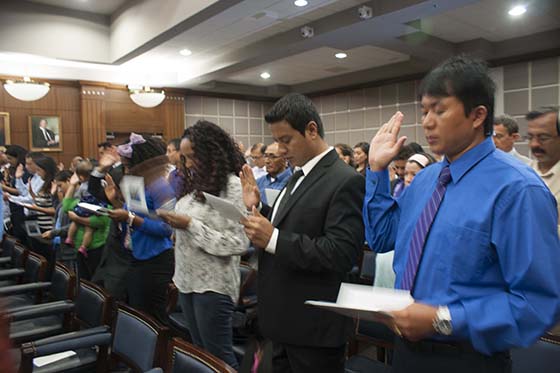This Week in Immigration Reform — Week Ending April 24
Week Ending April 24
This week in immigration reform: update on Texas lawsuit challenging administrative relief; NCLR continues our blog series on deferred action recipients; and USCIS joins with local governments on immigrant integration.
Keep up with the latest from UnidosUS
Sign up for the weekly UnidosUS Action Network newsletter delivered every Thursday.
Update on lawsuit challenging executive action: Last Friday the 5th Circuit Court of Appeals heard oral arguments in the case concerning President Obama’s November executive actions on immigration. An article in Politico notes that the court will likely rule 2-1 against the request for a lifting of the injunction placed on expanded DACA and DAPA by Judge Hanen. The oral arguments took the same tone as the political debate around the president’s contentious actions, and the next step might be taking the case to the Supreme Court. A large group of those supporting President Obama’s executive actions packed the courtroom and held a rally outside the courthouse. A decision from the three-judge panel could come at any time and those familiar with the process believe it will come within the next few weeks.
NCLR features DACA recipient Joel Sati: This week’s installment of our ‘Living the American DREAM’ blog series profiles 22-year-old college student Joel Sati, originally from Kenya. Joel learned he was undocumented in high school and slowly began taking classes at Montgomery College in Maryland. He was actively involved with United We Dream and advocating for the Maryland DREAM Act. When President Obama announced DACA in 2012, Joel’s activism paid off. Our blog notes: “For Joel, the impact of receiving DACA was life-changing. After graduating from Montgomery College as a Phi Theta Kappa honor student, he was accepted into the Skadden Arps Honors Program in Legal Studies at CCNY. Today, the philosophy major juggles a full course load and an internship at an immigration law firm in Harlem.” In the fall he will be applying to Ph.D. programs in philosophy and aspires to become a college professor.
Cities recognize importance of immigrant integration: This week USCIS and the city of Atlanta announced a new partnership to strengthen citizenship education and awareness efforts. Atlanta joins three other cities – Los Angeles, Chicago, and Nashville – to expand access to resources and information regarding naturalization. Atlanta Mayor Kasim Reed notes, “The contributions of immigrants and foreign-born residents to the cultural and economic fabric of Atlanta are irrefutable. In the City of Atlanta, immigrants are over-represented among the self-employed, and across our state, new immigrant business owners generate business revenue of $2.9 billion a year. Despite their proven value to our city, thousands of our eligible residents have not yet completed the naturalization process. That’s why I’m thrilled to announce a joint commitment with USCIS to expand access to citizenship in Atlanta, with all its privileges and responsibilities.”
Not only do legal immigrants contribute to the local, state and national economies, but undocumented immigrants do as well. A Washington Post article highlights a new report from the Institute on Taxation and Economic Policy, a nonpartisan nonprofit. The report found President Obama’s executive actions on immigration will generate an extra $845 million in taxes annually from immigrants living here undocumented. That is in addition to the $11.8 billion they already contribute.



